What's New
Displaying results 1501 - 1510 of 4913
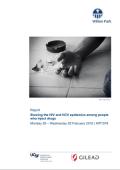
Resource | Publications,
Participants from many parts of the world, with different expertise and engagements with the Human Immunodeficiency Virus (HIV) and the Hepatitis C Virus (HCV) gathered at the Wilton Park facility of the United Kingdom Foreign and Commonwealth Office (FCO) on 26-28 February 2018 to consider ways of slowing the epidemics amongst people who inject drugs (PWIDs).
This meeting provided a timely opportunity to explore the impact of key global frameworks on reaching PWID with HIV and HCV prevention, treatment and care measures one year prior to the 2019 United Nations General Assembly Special Session on Drugs (UNGASS) to be held in New York. This report provides an overview of presentations and discussions, highlighting the most salient themes that emerged from the meeting.
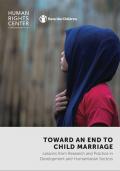
Resource | Publications,
The purpose of the study is to gather findings from efforts to prevent and respond to child marriage in both development and humanitarian contexts and determine what Save the Children and other organizations can do to improve their response to this critical issue. The study adds to existing research by synthesizing the most up-todate literature, bringing the voices of practitioners and experts into the discussion, and examining the topic of child marriage interventions in a humanitarian context for the first time.
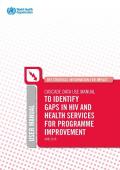
Resource | Tools,
This guide supports the use of data to identify and fill gaps in services in order to improve HIV and health programmes. Following from the Consolidated Strategic Information Guidelines, high-level indicators are organized along a cascade of services which are linked to achieve outcomes. The guide supports the ways in which these cascade data are analysed and used to identify gaps and better link services.
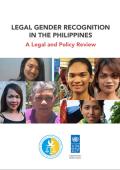
Resource | Laws and Policies,
The Legal Gender Recognition in the Philippines: A Legal and Policy Review is the cumulative result of the desk review of laws, regulations, and policies regarding legal gender recognition in the Philippines. It likewise included research into how these existing laws, regulations, and policies are implemented and how they impact or will impact on transgender people in the Philippines. The project also looked into local transgender community efforts and initiatives that could provide new platforms for asserting transgender rights or those which could open the doors for more enhanced collaboration among the various sectors.
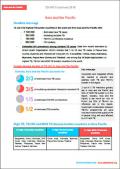
Resource | Fact Sheets,
Concerted and integrated efforts are needed to prevent and address both TB and TB-HIV burden in the region.
2 out of 3 TB infections globally are in Asia and the Pacific and 60% of MDR-TB burden is in this region. Globally, Asia and the Pacific is the home for 13% of PLHIV but 20% of TB-HIV co-infections are in this region. Systematic collaboration between TB-HIV programmes will save lives and improve the quality of life of people living with and affected by HIV and TB.
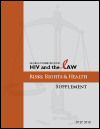
Resource | Publications,
In 2012, the Global Commission on HIV and the Law called on countries to outlaw discrimination, repeal punitive laws and enact protective laws to promote public health and human rights for effective HIV responses. Today more than 89 countries have taken action to repeal or reform laws: some have repealed laws criminalizing HIV, same-sex relations, and drug possession, and others have enacted laws advancing reproductive rights, sex education, and the human rights of people living with or at risk from HIV.
This Supplement highlights developments since 2012 in science, technology, law, geopolitics, and funding that affect people living with or at risk from HIV and its coinfections. The recommendations add to and amplify those of the Commission’s 2012 report Risks, Rights & Health, which remain as relevant as they were six years ago.
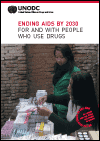
Resource | Fact Sheets,
The fact sheets provide information on facts and numbers of people who use drugs at a glance, challenges and vulnerabilities as well as HIV prevention, treatment in infographics.
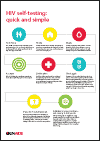
Resource | Infographics,
The decision to take an HIV self-test is yours and yours alone. No one else should force you to take an HIV test, either an HIV self-test or any other type of HIV test.
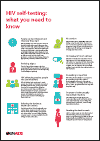
Resource | Infographics,
People can test wherever and whenever they want. HIV self-testing empowers people to find out their HIV status wherever and whenever they want. Since it is easy, quick and private, people may be encouraged to take a test earlier than they would if they had to visit a health facility, potentially bringing an earlier diagnosis. Any HIV-positive result must, however, be followed up with a second test by a health-care provider to confirm the result and get linked to appropriate prevention, treatment and care.
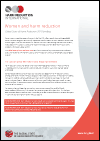
Resource | Fact Sheets,
Women are estimated to account for one third of the 275 million people who use drugs globally. Women who use drugs are consistently reported to have less access to harm reduction services and to be at higher risk of HIV and hepatitis C infection than men who use drugs. Despite these reports, robust data on this subject is scarce, and research on drug use and related health issues rarely produces information about women.
The Global State of Harm Reduction 2018 identifies a number of key issues and themes reflected across the world that limit women’s access to harm reduction services, and highlights cases of good practice.





